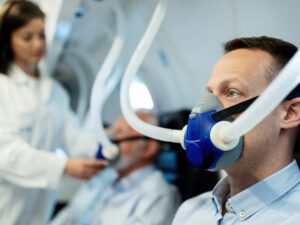Psychological nursing care in diagnosis, treatment, nursing and disease prevention is becoming more and more prominent. Hyperbaric oxygen theraphy is a new discipline, that serves both conscious individuals, as well as those in unconscious or comatose states, highlights the breadth of its applicability.
The psychological care of oxygen therapy is not only aimed at the users, but also at the families of the users. Psychological care can make users and their families firm in confidence, eliminate strangeness and fear, and achieve the goal of early physical and mental recovery.
1. Psychological Nursing Before Hyperbaric Oxygen Therapy
Nervous Fear
Not only do some users lack knowledge of hyperbaric oxygen therapy, but even when they see the huge airtight oxygen chamber. They think that the oxygen chamber is a high-pressure container, which means there is a danger of explosion. They think that oxygen-assisted combustion may cause a fire, and they are worried about accidents. Moreover, the hyperbaric oxygen treatment needs to be sealed in the cabin for about 2 hours.
Closed treatment brings a great psychological burden to the users and their families, and they are full of fear of the treatment process. In response to this situation, management personnel actively communicate with users and their families to publicize the principles of hyperbaric oxygen therapy, especially safety education.
Users and family members introduce the treatment environment and show them hyperbaric oxygen chamber equipment, safety measures, etc.To increase the sense of security of users and their families, please old users and new users talk about the feelings of hyperbaric oxygen therapy.
Pessimistic and Skeptical Psychology
Users of hyperbaric oxygen, not only users of carbon monoxide poisoning, but also patients with some diseases may have a long course of disease and poor compliance with treatment. Insufficient confidence, the process of receiving treatment is relatively passive.
In this case, the management personnel should understand with sincerity, patiently and meticulously explain the questions raised by the users, repeatedly explain the principle of hyperbaric oxygen therapy, the time when the treatment generally appears effective, and let them read the information about the course of hyperbaric oxygen therapy.
When assigning seats, new and old users can be mixed and arranged, and old users are invited to tell their own stories and introduce the feeling and curative effect of receiving hyperbaric oxygen therapy. Through the above-mentioned exchanges, users can eliminate fear, enhance courage and confidence in treating diseases, and accept treatment with a good attitude.
| Feature |
Pessimistic View on Hyperbaric Chamber Use |
Skeptical View on Hyperbaric Chamber Use |
| Definition |
Expects negative or limited outcomes and may view the chamber as potentially harmful or ineffective. |
Questions the efficacy and safety of the chamber, requiring evidence and data before forming an opinion. |
| Focus when evaluating HBOT |
Potential side effects, limitations, and potential for overhype or misuse. |
Research studies, clinical trials, and empirical evidence supporting or refuting HBOT’s effectiveness and safety. |
| Reaction to Anecdotal Evidence |
Likely dismisses positive anecdotal evidence, emphasizing negative stories or potential placebo effect. |
Anecdotal evidence is taken with caution, prioritizing controlled and peer-reviewed studies. |
| Concerns |
Adverse effects like barotrauma, oxygen toxicity, claustrophobia, and potential misuse in conditions not approved for HBOT. |
Evidence of HBOT’s efficacy for various conditions, potential side effects, and the quality of studies conducted. |
| Perceived Benefits of HBOT |
May believe benefits are limited to very few conditions, if any at all. |
Open to accepting benefits if they are supported by robust, empirical evidence. |
| Reaction to New Research |
May expect new research to confirm its limited efficacy or reveal new risks. |
Waits for peer-review and replication before accepting new research conclusions. |
| Associated Stances |
May believe that the hyperbaric chamber is over-marketed or that it gives patients false hope. |
Seeks more research, prefers evidence-based treatments, and may advocate for rigorous scientific investigation of HBOT. |
Anxious for Success, Hard to Persist
Due to the long time of hyperbaric oxygen treatment and the long course of treatment, many users can not persist in the treatment, especially users with early carbon monoxide poisoning. Affected by the economic conditions of the family, some users will not want to continue the treatment once their symptoms improve.
In response to this situation, first of all, the role of hyperbaric oxygen therapy is repeatedly emphasized, and it is not advisable to emphasize this idea. Because after giving up the treatment, it is found that delayed encephalopathy not only wastes all previous efforts, but also is very troublesome to treat.
Not only does the course of treatment prolong, but the treatment effect is not good, and it causes a greater economic burden to the user. Do a good job in the ideological work of the users and their families, and combine the examples in the work to explain that although the symptoms have been relieved or disappeare.
The cause has not been completely eliminated, and help users build confidence and determination to continue treatment, weigh the pros and cons to make the right choice.

2. Psychological Nursing in Hyperbaric Oxygen Therapy
Pressurization Phase
Before entering the cabin, introduce the discomfort that may occur during the treatment to the user and accompanying family members. Personally demonstrate and teach the user the essentials of opening the Eustachian tube. Guide the correct wearing of the oxygen inhalation mask and the correct oxygen inhalation method. When boosting the pressure after closing the cabin door, communicate with the user through the intercom in time.
Get in touch, ask the user to pinch the nose and inflate. At the same time, you can also play some music, songs, etc. to distract the user’s attention and relieve the user’s fear and tension. If there is an earache, the pressurization should be stopped immediately, and the user should make adjustments until the earache symptoms disappear, and then pressurize again, so that the user can gradually adapt to stabilize the user’s emotions.

Stabilization Stage
It is also the stage of oxygen inhalation. Since the pressure in the cabin does not fluctuate, the user is relatively stable, but we still have to closely observe the user’s movements, expressions, etc. Often ask the user whether they are comfortable, and report personal status to the cabin user from time to time. Oxygen inhalation situation, which not only meets the needs of users
It is a way of psychological treatment at this time to dispel worries again. Coupled with relaxing and pleasant music, the user’s restless mood can be relieved, and the user no longer feels the boring of oxygen inhalation and the long treatment time. The whole process of oxygen inhalation can be completed unconsciously, so as to obtain a good therapeutic effect.
Decompression Phase
The user may feel mild discomfort in the ear during decompression, tell the user the cause of discomfort, eliminate tension. Hold your breath to prevent decompression sickness.
Psychological Care
When the cabin pressure is reduced to zero, the management personnel should quickly open the cabin door for the user. Keep abreast of the situation and feelings in the cabin, and tell the user was a little tired and uncomfortable in the eardrum after inhaling oxygen. After a few days, he should take a good rest and ensure adequate sleep.
Through observation and conversation, it is found that the user’s bad emotions, actively counseling and comforting, and preaching the precautions after leaving the cabin, to ensure the smooth progress of the next treatment .
3. Experience
In the process of hyperbaric oxygen therapy, psychological care cannot be ignored, and should run through the entire hyperbaric oxygen therapy work. The good quality of management personnel is the premise of completing the psychological care of hyperbaric oxygen therapy users. Good quality includes many factors such as basic knowledge, self-cultivation, appearance, clothing, good temperament and psychological quality of managers, all of which are indispensable.
Eliminate factors that are not conducive to treatment through patient, meticulous, and thoughtful care . Managers should show enthusiasm and confidence in their speech and demeanor to win the trust of users, help users understand problems, reduce psychological burden, improve their confidence in curing diseases, and maximize the therapeutic effect of hyperbaric oxygen therapy .




